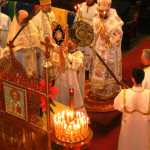by Fr. Patrick Henry Reardon
 God seems to have chosen the Apostle Paul to demonstrate—arguably more than any other person in Christian history—how the life “in Christ” arrives at insight through experience. That is to say, the reader of the Pauline letters can actually discern, by the study of these letters, how their author, in the circumstances of his life in Christ, came to perceive certain truths through personal experience. The Pauline revelation cannot be put asunder from the Pauline experience.
God seems to have chosen the Apostle Paul to demonstrate—arguably more than any other person in Christian history—how the life “in Christ” arrives at insight through experience. That is to say, the reader of the Pauline letters can actually discern, by the study of these letters, how their author, in the circumstances of his life in Christ, came to perceive certain truths through personal experience. The Pauline revelation cannot be put asunder from the Pauline experience.
If this is the case of Paul
“more than any other person in Christian history,”
the reason may be simply that Paul’s words are the Word of God. His perceptions of truth through experience were not simply personal; he arrived at them through divinely conferred insight by the Holy Spirit and wrote them down with that divinely guaranteed authority. His epistles stand forever as the divinely chosen model of how the Christian arrives at truth through experience. In Paul, that is to say, we are given a vision of the Christian life itself as revelatory of the dynamism of divine grace.
Because Paul’s letters—with the possible exception of the Epistle of Saint James—are the earliest writings of the New Testament, he is sometimes called the Church’s first theologian. This designation is appropriate, I believe, in the sense that Paul is our earliest extant writer of Christian theology.
On the other hand, Paul’s historical priority among the apostolic writings also renders it extremely important that his letters be correctly understood. And, in fact, misunderstandings of this Apostle go back a very long way, as even Saint Peter testified (2 Peter 3:14-16). I recall my father’s comment, when I was but a child, that the Epistles of St. Paul were a major source of heresy down through the centuries.
In the second century the worst misunderstanding of Paul was that of Marcion. Indeed, I rarely think of Marcion without remembering what Franz Overbeck, almost a hundred years ago, said of St. Paul:
“He has had only one student who understood him, Marcion—and he misunderstood him!” (Er habe nur einen Schüler gehabt, der ihn verstanden habe, Marcion–und dieser habe ihn missverstanden!‘)
Marcion’s misinterpretation of Paul, nonetheless, forced the Catholic Christians of the second century to reflect deeply and critically about the problems of biblical interpretation and how to resolve them. Largely in reaction to Marcion they insisted that the writings of the Apostles were correctly understood, not by latecomers claiming some special and rather private knowledge of the apostolic mind, but according to the traditions of the local churches the Apostles themselves had founded.
After all, Paul had conferred an inherited doctrinal authority on the ministers ordained to succeed him in the pastoral ministry in the local churches. Paul did not tell them, “in case of a doctrinal dispute, just study my epistles very carefully, using grammars, dictionaries and the latest exegetical theories, and that should clear up the difficulty.”
He said, rather,
“take heed to yourselves and to all the flock, among which the Holy Spirit has made you overseers (episkopous), to shepherd the church of God which he purchased with his own blood. For I know this—that after my departure savage wolves will come in among you, not sparing the flock” (Acts 20:28-30).
The second century Catholics were convinced they were seeing, in their own lifetime, exactly that crisis of doctrine foretold by Paul, and they were certain that Marcion was one of the wolves against which St. Paul had warned them.
This is the proper approach to Paul’s epistles and the other apostolic writings. They do not come down to us as raw texts we must somehow figure out with the proper grammatical tools. A merely academic approach to Paul’s letters is not adequate, not only because this author is much harder to understand, but also because misinterpreting Paul poses a greater spiritual danger; to misinterpret Paul is to misunderstand the Gospel itself.
I believe we should read Paul, then, through the understanding of his earliest disciples and defenders, those Catholic Christians in the churches that Paul had a hand in founding. These churches, closely associated with the composition and copying of the epistles, and pastored by Timothy and others among Paul’s immediate disciples, rightly enjoyed a recognized authority in the determination of early Christian doctrine.
